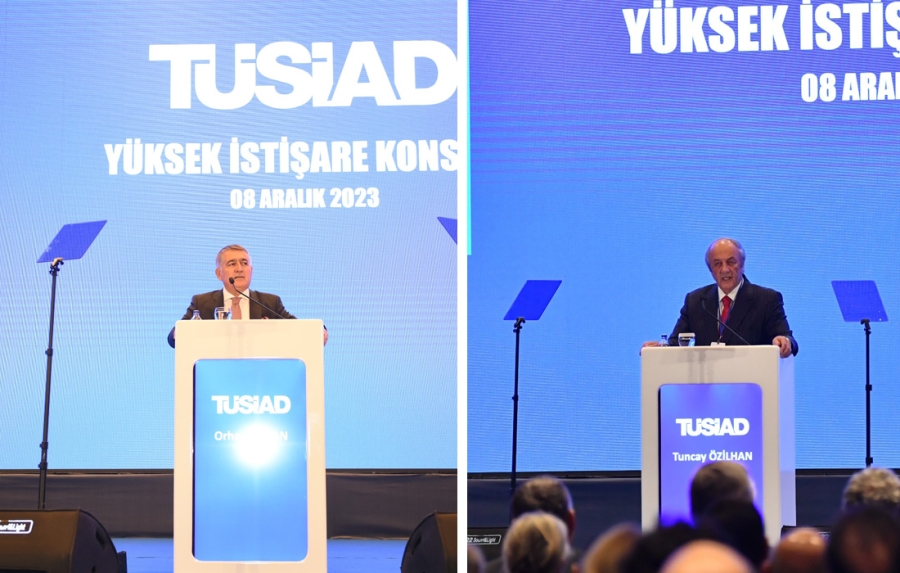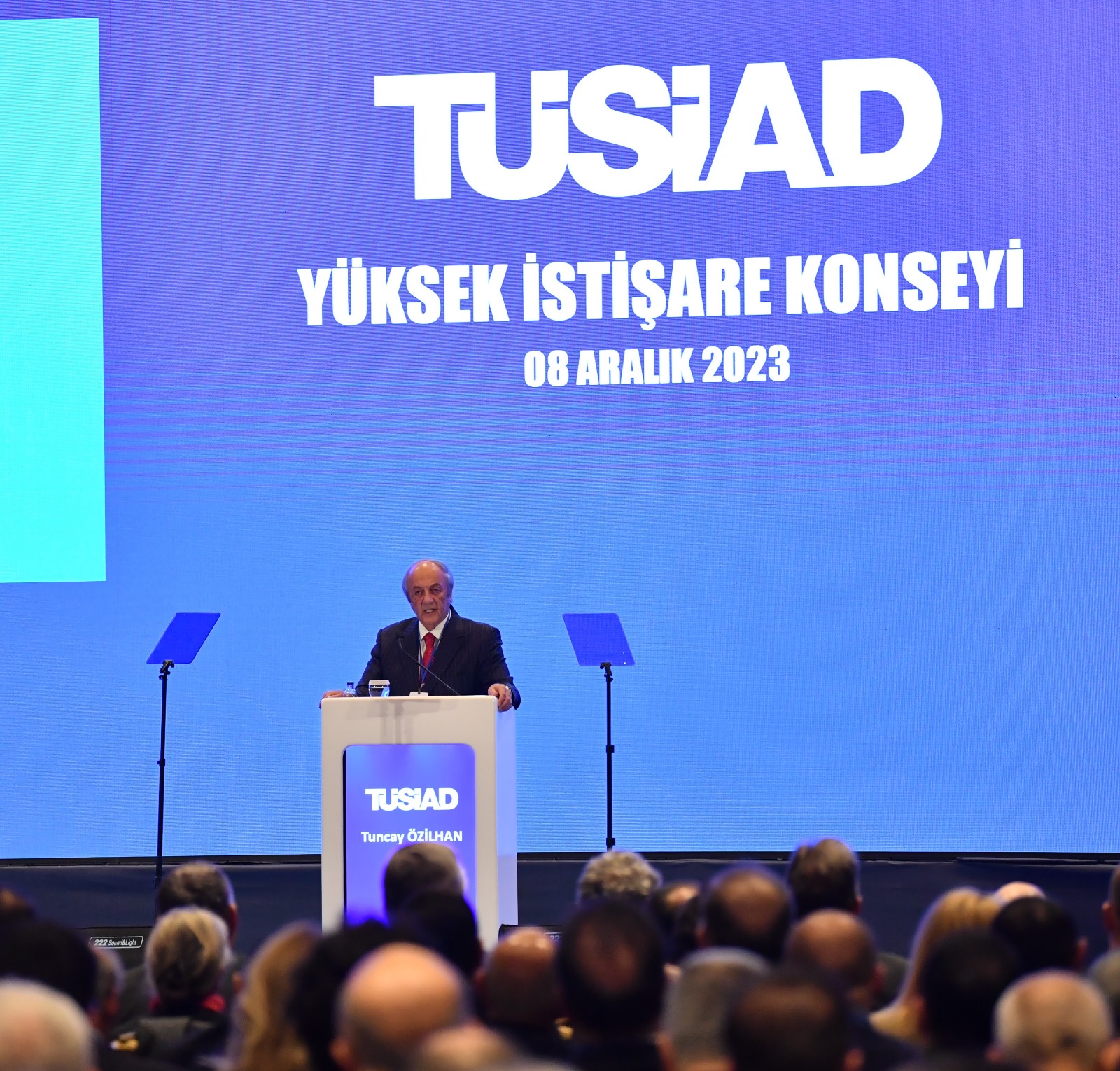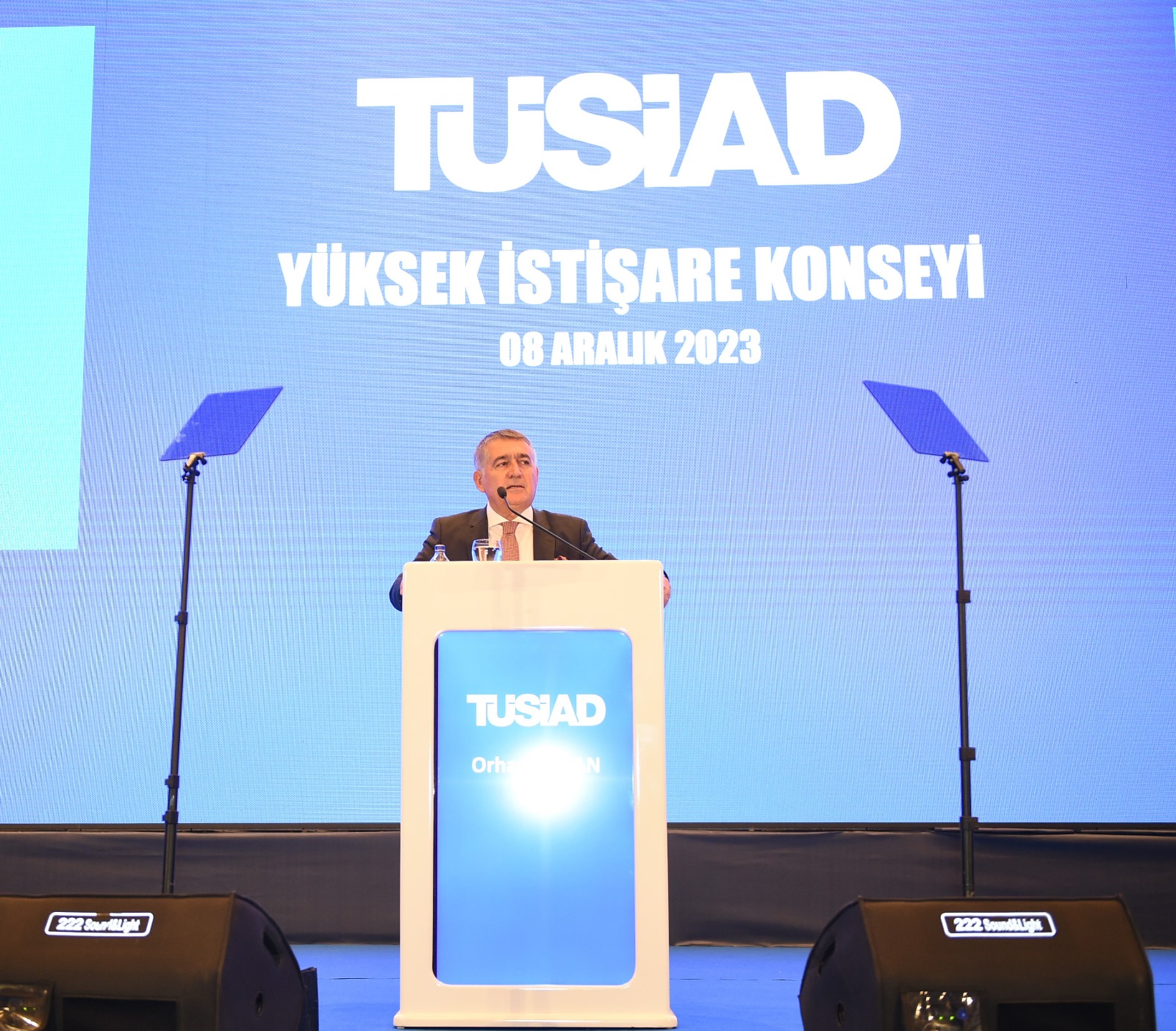2023 commemorates the centennial of the Turkish Republic. To mark this momentous occasion TÜSİAD organized a series of workshops and roundtable discussions with the participation of over 200 stakeholders nationwide to discuss a wide range of policy issues that will affect the trajectory of the Republic. The workshops and roundtables were organized under four generalized headlines: Democracy and the Republic; Global Transformation and National Strategy; Welfare and Distribution; and Environment and Development. The final report entitled “Türkiye in the Second Century of the Republic” was released publicly during the High Advisory Council meeting in Ankara.
A full text of the report can be found here: https://www.cumhuriyetinikinciyuzyili.org/
Video of the panel discussion can be found here: https://www.youtube.com/watch?v=gZwR6rL1NY4
High Advisory Council Meeting:
Orhan Turan, President of the Board of Directors, and Tuncay Özilhan, President of the High Advisory Council, delivered opening remarks at the event.
In his opening remarks, President Turan reiterated the Turkish business world’s calls for reforms and the strengthening of democratic standards and the rule of law.
He explained that the problems facing Türkiye could be addressed by four fundamental questions:
(1) how will we strengthen the Republic and democracy together?
(2) how will we position our national strategy during global transformations?
(3) how will we achieve a fair distribution while increasing prosperity?
(4) how will we protect the environment while ensuring development?
Below are excerpts of his remarks:
On Welfare and Distribution:
“Unless the benefits of growth are distributed across society, high growth rates alone will not take us to the future we envision.
“To achieve our vision, we need to address all inequalities in various areas, including education, gender, access to digital opportunities, enjoying freedoms, assuming ecological and environmental costs, participating in political decision-making processes, and access to justice and rights.
On Environment and Development:
“Türkiye needs to change its approach and increase its efforts in combating climate change. Research shows that transitioning to renewable energy sources, improving energy efficiency throughout the supply chain, and embracing green transformation not only enhance energy security but also provides significant opportunities for our economy.
On Democracy and the Republic:
“There was a strong emphasis on equality and justice, highlighting the need to build a new future. Our Republic has significant achievements, including the transfer of sovereignty to the people, equal citizenship, education and equal opportunity, institutionalization, secularism, and women's rights. We observed widespread endorsement of the success of the Republic, especially regarding secularism. However, questions were raised about the stability of democracy despite all political, economic, and institutional successes.
“There was a general consensus in the workshops regarding the limitations of channels for political participation, rights and freedoms, the rule of law, and checks and balances. It was acknowledged that there is a need to make progress towards the equality of every citizen, without discrimination based on language, religion, race, ethnic origin, or gender. Reconsidering the individual-state and society-state relationships is necessary.
Global Transformation and National Strategy:
“There is a consensus that Türkiye needs to reconsider its national strategy with a new perspective. There is a need to prioritize Türkiye's goal of increasing economic prosperity as it formulates its foreign policy. The fundamental consensus was not to abandon Türkiye's existing alliances. Another point highlighted in our workshops, especially given the multiple crises in the world, was the increased importance of relations with Europe.
“The increasingly complex and challenging geopolitical environment has had a positive impact on Türkiye-EU relations within the framework of the EU's efforts to strengthen security. Global developments are pushing Türkiye and the EU closer, highlighting the indispensability of each side for the other. With this report, we anticipate the development of Türkiye-EU relations in all areas based on trust and consensus.”
The President of the High Advisory Council Tuncay Özilhan echoed these remarks. In his remarks, Özilhan focused on what was required to fulfil Atatürk's objective of reaching contemporary civilization:
“Our economic priority should no longer be achieving high growth at any cost. Our goal should be the happiness, freedom, and prosperity of our people, living with high self-confidence. This requires a long-term commitment to progress in science, technology, culture, art, and sports, sustainability, inclusivity, and the development of employment opportunities that provide good living conditions.
“The fundamental characteristic of a strong market economy is a robust institutional structure and a sound legal system. In a modern state governed by the rule of law, everyone's life and property are protected. Contracts are enforced within the legal system. Trials are fair, and everyone is equal before the law. Laws are clear and applied equally to everyone. There are no contradictions in court decisions, and they are binding for everyone. International norms and treaties are respected. When legislating, best practices are considered, the views of relevant parties are sought, and impact assessments are conducted.
“In strong market economies, predictability is essential in the administrative system and decision-making. Transparency and accountability are guaranteed. The separation of powers and checks and balances mechanisms work effectively. Emphasis is placed on pluralism rather than majority rule. Regulatory institutions are autonomous, and appointments are based solely on merit. In such an environment, enterprises make economic decisions with confidence in the future.
“In strong market economies, there is no place for clientelism in economic decision-making; decisions are made solely based on economic variables. In situations where these conditions are not met, the country's risk premium rises, the cost of investments increases, and corruption and unfair practices become widespread. In a country where the institutions and rules of a modern rule of law do not function effectively, foreign investors show little interest. Foreign investments take the form of hot money rather than direct capital investments.
“To ensure macroeconomic stability, generally accepted monetary and fiscal policies are observed. Macroeconomic stability and the rule of law facilitate the decision-making process for investments by providing predictability in the long term. When combined with emphasis on science and education, this opens the way for technological progress. Technological progress is the primary source of increased productivity and social welfare. Growth processes that do not rely on technological progress are weak, unbalanced, and not sustainable.
“Looking at the data, we observe that the best educational institutions, the most creative minds, and the highest share of GDP allocated to R&D are generally found in strong market economies. We know that new ideas and innovations that shape an era do not emerge from oppressive societies. A strong rule of law that opens and nurtures the way for creativity, the entrenched nature of democratic traditions, tolerance for even the most dissenting ideas, freedom of the press, and the importance given to culture and the arts all contribute to fostering creativity.
“Moreover, in strong market economies, it is noteworthy that social safety nets and welfare programs are robust to mitigate income inequalities and enhance inclusivity. Broad employment opportunities, more balanced income distribution, support for disadvantaged segments of society, and consideration for inclusivity contribute to increasing happiness and welfare levels in a country, which fosters social peace.
“Today, we are in a more optimistic position compared to six months ago in achieving these goals. With the new economic management team, we have entered a period where markets have higher levels of confidence in economic policies. After a period of 10 years of unpredictability and high volatility in economic policies, orthodox economic policies have been reintroduced. In theory and in practice, these policies are extending the investment horizon for investors. The Country Risk Premium, which had reached 900 basis points before the elections, has decreased to 350 basis points, expanding the financing opportunities for long-term investments.
“The steps taken by our Central Bank towards tightening monetary policy are reinforcing our hope that the inflation problem will be resolved.
“For the success of economic management, perhaps the most decisive issue is the trust in the legal system. Therefore, we consider it crucial to avoid initiatives that would undermine confidence in the legal system for our economic performance.
“Perhaps the Republic's greatest achievement was ensuring equal opportunities in education. I am confident that many individuals in this hall today, including those in the business world, bureaucracy, and politics, hold their current positions thanks to the equal opportunities provided by the Republic to them or their parents. Of course, when we talk about equal opportunities in education, we mean not just everyone going to school but everyone accessing quality education without barriers.
“While equipping our youth with the skills required by new technologies, we must also emphasize the importance of training programs to enhance the skills of our current workforce.
“Our sole foundation for economic growth is our people—workers, entrepreneurs, scientists, researchers contributing to technological innovations, men, and women alike. The decline in the qualifications of our people, brain drain, pose significant obstacles to overcoming the middle-income trap.
“In the twenty-first century, the path to modern civilization passes through the rule of law, the establishment of democratic standards, the internalization of secularism, the guidance of science, equal opportunities in education, equal participation of women in all fields, and sustainability.
Full text of Orhan Turan’s speech:
https://tusiad.org/tr/basin-bultenleri/item/download/10063_495e6dc9de458582fb113d7fcd753ba1
Full text of Tuncay Özilhan’s speech:
https://tusiad.org/tr/basin-bultenleri/item/download/10064_c6dd3704b4beb3356e7ad362de2e5967


